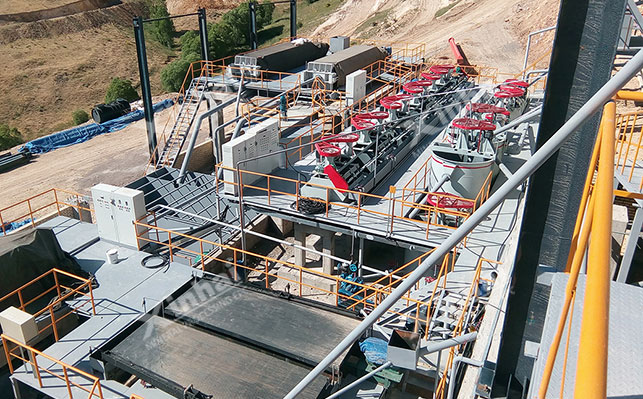As people continue to develop and utilize mineral resources, the number of tailings is increasing day by day, especially gold flotation tailings. After flotation, the tailings still contain chemical agents and harmful metal elements. Large-scale storage will pollute the environment and occupy land area. More importantly, there are likely to be metal or non-metal elements worth recovering in gold flotation tailings, so further recovery of gold tailings is an important issue.

Usually when flotating gold ore, we pay more attention to the recovery of gold and ignore the existence of other valuable substances. In fact, the following valuable elements are likely to exist in gold tailings after flotation:
1. Non-ferrous metal minerals: Gold tailings often contain non-ferrous metal minerals such as copper (Cu), lead (Pb), zinc (Zn) and tungsten (W). These minerals can usually be recovered through a single flotation process, but the concentrate grade is often low and the recovery rate is not high, so it is necessary to optimize the flotation process to improve the recovery efficiency.
2. Non-metallic minerals: The main feature of non-metallic minerals in gold tailings is that they contain more than 80% of minerals such as silicon aluminum oxides. Quartz, sericite, feldspar, etc. can be effectively recovered through flotation process. The recovery of these non-metallic minerals is of great significance for resource utilization.
3. Iron minerals: Gold tailings also contain a certain amount of iron minerals, which can be recovered by magnetic separation and other methods.
4. Rare earth elements and other valuable elements: With the continuous advancement of mineral processing technology, the recycling technology of Fe, Cu, Sn, Au, rare earth elements, rare elements, scattered elements, etc. in tailings and the new technology of mineral processing of low-grade fluorite, quartz, feldspar, kaolinite, apatite, barite and other non-metallic minerals are constantly emerging, which provides the possibility of improving the utilization rate of mineral resources.
5. Associated elements: Gold tailings may also contain other associated valuable elements, such as silver (Ag), which can be recovered by flotation and other methods.
How to recover gold flotation tailings by gravity separation?
It is difficult to achieve ideal recovery results with a single re-selection process, but the re-selection method can still be combined with other mineral processing processes to recover valuable materials together. The following steps are performed:
1. Classification: First, the flotation tailings are classified by a cyclone to separate the coarse and fine particles. The coarse particles usually contain more gold, so they are the focus of re-selection.
2. Selection of re-selection equipment: According to the density difference, a variety of re-selection equipment can be used, such as shaking table, spiral chute, horizontal centrifuge, suspended cone concentrator and Nelson. These equipment can effectively enrich gold-bearing minerals and tungsten minerals.
3. Re-selection process test: Through different re-selection process tests, such as single shaking table re-selection test, classification-regrinding shaking table re-selection test, spiral chute-shaking table re-selection test, etc., the best re-selection process is determined. These tests help to select a re-selection process that is easy to operate and efficient.
4. Treatment of gravity concentrate: During the gravity separation process, natural gold, gold-containing minerals (such as pyrite) and scheelite with high density will be enriched in the gravity concentrate, while light minerals such as quartz and mica with low density will enter the gravity tailings. Gravity separation effectively enriches the valuable metals Au and WO3.
5. Flotation separation: Since the grade of gold and tungsten is low and the amount of minerals is small, it is difficult to separate them through gravity separation. Therefore, it is necessary to separate gold and tungsten from gravity concentrate by flotation to obtain gold concentrate and tungsten concentrate.
6. Tailings reprocessing: Gravity tailings can be further recovered by magnetic separation to recover iron minerals, and the fine particles can be processed by the tailings concentration system to achieve dry discharge and resource utilization of tailings.
7. Environmental protection and economic benefits: This comprehensive recovery method has the advantages of simplicity, low cost and non-toxicity, which can effectively improve the recovery rate of gold and reduce environmental pollution.
It can be seen that there may still be useful minerals in the flotation gold tailings, and it is necessary to further recover them to improve the utilization rate of resources and avoid resource waste. During the recovery process, a single gravity separation process can be used for recovery, or magnetic separation, flotation and other processes can be used to recover useful minerals. Regardless of the recovery method, gold tailings should be subjected to mineral processing tests to ensure recovery results and economic benefits.